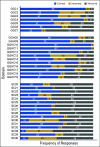Whole-Genome and Whole-Exome Sequencing in Pediatric Oncology: An Assessment of Parent and Young Adult Patient Knowledge, Attitudes, and Expectations
- PMID: 32913997
- PMCID: PMC7446494
- DOI: 10.1200/PO.17.00104
Whole-Genome and Whole-Exome Sequencing in Pediatric Oncology: An Assessment of Parent and Young Adult Patient Knowledge, Attitudes, and Expectations
Abstract
Purpose: The complexity of results generated from whole-genome sequencing (WGS) and whole-exome sequencing (WES) adds challenges to obtaining informed consent in pediatric oncology. Little is known about knowledge of WGS and WES in this population, and no validated tools exist in pediatric oncology.
Methods: We developed and psychometrically evaluated a novel WGS and WES knowledge questionnaire, the Precision in Pediatric Sequencing Knowledge Questionnaire (PIPseqKQ), to identify levels of understanding among parents and young adult cancer survivors (≥ 18 years old), off therapy for at least 1 year from a single-institution pediatric oncology outpatient clinic. Participants also completed health literacy and numeracy questionnaires. All participants provided written informed consent.
Results: One hundred eleven participants were enrolled: 76 were parents, and 35 were young adults. Of the total cohort, 77 (69%) were female, 63 (57%) self-identified as white, and 74 (67%) self-identified as non-Hispanic. Sixty-six (59%) had less than a college degree. Adequate health literacy (n = 87; 80%) and numeracy (n = 89; 80%) were demonstrated. Internal consistency was high (Cronbach's α = .88), and test-retest reliability was greater than the 0.7 minimum requirement. Scores were highest for genetic concepts related to health and cancer and lowest for WGS and WES concepts. Health literacy and educational attainment were significantly associated with PIPseqKQ scores. Overall, participants felt the benefits of WGS and WES outweighed the potential risks.
Conclusion: Parents and young adult cancer survivors have some genetics knowledge, but they lack knowledge about WGS and WES. The PIPseqKQ is a reliable tool that can identify deficits in knowledge, identify perceptions of risks and benefits of WGS and WES, and help clinicians tailor their consent discussions to best fit families. The PIPseqKQ also may inform the development of educational tools to better facilitate the informed consent process in pediatric oncology.
© 2018 by American Society of Clinical Oncology.
Conflict of interest statement
The following represents disclosure information provided by authors of this manuscript. All relationships are considered compensated. Relationships are self-held unless noted. I = Immediate Family Member, Inst = My Institution. Relationships may not relate to the subject matter of this manuscript. For more information about ASCO's conflict of interest policy, please refer to www.asco.org/rwc or ascopubs.org/po/author-center. Jennifer A. ObergNo relationship to discloseJenny RuizNo relationship to discloseTrisha Ali-ShawNo relationship to discloseKathryn A. SchlechtwegNo relationship to discloseAngela RicciNo relationship to discloseAndrew L. KungConsulting or Advisory Role: Darwin Health, MI Bioresearch, Imago Bioscience Patents, Royalties, Other Intellectual Property: Royalty from licensing agreements with MI BioresearchWendy K. ChungConsulting or Advisory Role: Regeneron Genetics Center Research Funding: BiogenPaul S. AppelbaumNo relationship to discloseJulia L. Glade BenderResearch Funding: Bristol-Myers Squibb (Inst), Pfizer (Inst), Novartis (Inst), Ignyta (Inst), Amgen (Inst), Celgene (Inst), Eisai (Inst), Lilly (Inst), Merck (Inst) Travel, Accommodations, Expenses: Novartis, Amgen, MerckJennifer M. LevineNo relationship to disclose
Figures



Similar articles
-
Genetic counselors' views and experiences with the clinical integration of genome sequencing.J Genet Couns. 2014 Aug;23(4):496-505. doi: 10.1007/s10897-014-9709-4. Epub 2014 Mar 28. J Genet Couns. 2014. PMID: 24671342
-
Stakeholders' opinions on the implementation of pediatric whole exome sequencing: implications for informed consent.J Genet Couns. 2014 Aug;23(4):552-65. doi: 10.1007/s10897-013-9626-y. Epub 2013 Jul 12. J Genet Couns. 2014. PMID: 23846343 Free PMC article.
-
Overcoming challenges to meaningful informed consent for whole genome sequencing in pediatric cancer research.Pediatr Blood Cancer. 2015 Aug;62(8):1374-80. doi: 10.1002/pbc.25520. Epub 2015 Apr 1. Pediatr Blood Cancer. 2015. PMID: 25832998
-
Use of whole exome and genome sequencing in the identification of genetic causes of primary immunodeficiencies.Curr Opin Allergy Clin Immunol. 2012 Dec;12(6):623-8. doi: 10.1097/ACI.0b013e3283588ca6. Curr Opin Allergy Clin Immunol. 2012. PMID: 23095910 Review.
-
Added Value of Reanalysis of Whole Exome- and Whole Genome Sequencing Data From Patients Suspected of Primary Immune Deficiency Using an Extended Gene Panel and Structural Variation Calling.Front Immunol. 2022 Jun 30;13:906328. doi: 10.3389/fimmu.2022.906328. eCollection 2022. Front Immunol. 2022. PMID: 35874679 Free PMC article. Review.
Cited by
-
Clinical and analytical validation of FoundationOne®CDx, a comprehensive genomic profiling assay for solid tumors.PLoS One. 2022 Mar 16;17(3):e0264138. doi: 10.1371/journal.pone.0264138. eCollection 2022. PLoS One. 2022. PMID: 35294956 Free PMC article.
-
Knowledge, attitudes and decision regret: a longitudinal survey study of participants offered genome sequencing in the 100,000 Genomes Project.Eur J Hum Genet. 2023 Dec;31(12):1407-1413. doi: 10.1038/s41431-023-01470-1. Epub 2023 Oct 3. Eur J Hum Genet. 2023. PMID: 37789083 Free PMC article.
-
"Balancing Expectations with Actual Realities": Conversations with Clinicians and Scientists in the First Year of a High-Risk Childhood Cancer Precision Medicine Trial.J Pers Med. 2020 Feb 14;10(1):9. doi: 10.3390/jpm10010009. J Pers Med. 2020. PMID: 32075154 Free PMC article.
-
Duality of purpose: Participant and parent understanding of the purpose of genomic tumor profiling research among children and young adults with solid tumors.JCO Precis Oncol. 2019;3:PO.18.00176. doi: 10.1200/po.18.00176. Epub 2019 Jan 22. JCO Precis Oncol. 2019. PMID: 31240271 Free PMC article.
-
Attitudes towards genetic testing and information: does parenthood shape the views?J Community Genet. 2020 Oct;11(4):461-473. doi: 10.1007/s12687-020-00462-8. Epub 2020 Apr 4. J Community Genet. 2020. PMID: 32248430 Free PMC article.
References
Grants and funding
LinkOut - more resources
Full Text Sources

